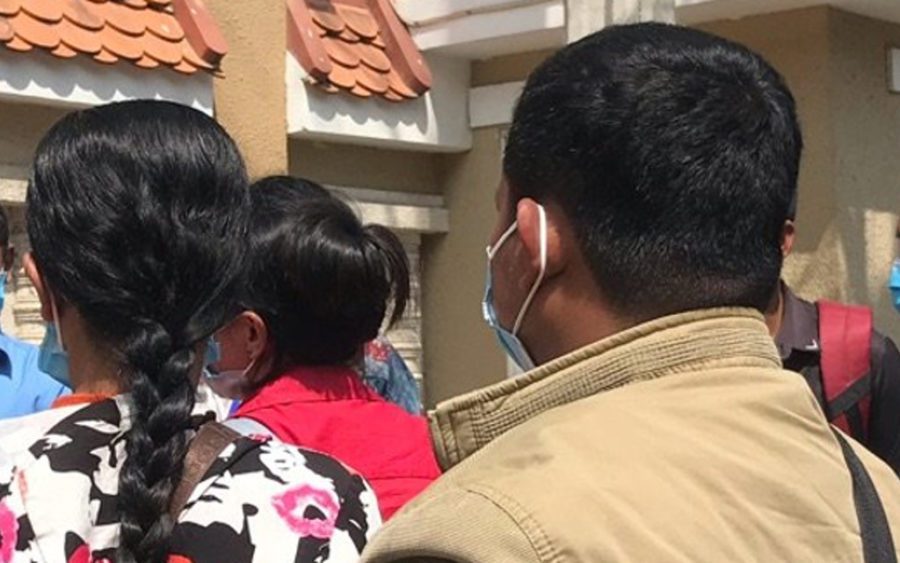The director of a closed Korean-language training center denied the fraud and trafficking charges against him in court on Thursday, saying his school only taught dozens of workers who paid him $80,000 in total, and he had not acted as a migrant labor recruiter — but he was willing to return their money.
Roeun Ratha, 31, director of Anh Sang school in Kampong Chhnang province, was charged with fraud with aggravating circumstances and unlawful removal for cross-border transfer, alongside Pen Sok, 35, director of Samsung Korean Language Training Center in Phnom Penh’s Pur Senchey district.
They were arrested in December 2019 and November 2020, respectively, and each face up to 20 years in prison.
At the Phnom Penh Municipal Court on Thursday morning, Ratha denied both the allegations against him and knowing Sok.
Ratha said he recruited students for Korean-language training, charging $200 per session or $5,000 for a package that included the language training, a blood test necessary for travel abroad, and room and board until they passed a Labor Ministry test allowing them to work overseas.
Ratha said his school had a license to offer language training but no permission to send trainees to work overseas.
“I have no right to send them out. I just teach,” he said.
Ratha managed the Anh Sang school from 2016 till its closure in 2018 following a complaint against him. According to the plaintiffs’ lawyer, Ham Sunrith, 25 people had made formal complaints against Ratha.
“If you only teach job skills, no one would be filing a complaint against you,” Presiding Judge Ouk Reth Kunthea told Ratha. “They said [your] school promised to send them overseas, but the result turned out to be disappointing, and it is not like what they expected.”
After a hearing earlier this month, some alleged fraud victims said rather than going to South Korea to work in a salon as originally promised, they were sent to Dubai to work in a massage parlor. One said outside the court, “I was asked to sell my body. … They said if we did the extra business, we could earn more money.”
On Monday, Judge Reth Kunthea told Ratha the court was giving him the chance to tell the truth for the last time.
Ratha maintained his innocence, but said he was willing to repay the plaintiffs based on his ability.
“So, what are the mistakes you would acknowledge?” asked deputy prosecutor Song Chhorvoan.
“I would accept that I failed to fulfill my duty in repaying them,” Ratha said.
When the deputy prosecutor asked how many people had paid him but never went overseas, Ratha said he did not remember.
“I sold my house and two plots of land to pay back money,” he told the court. “I don’t know how much I have to repay.”
But Ratha added that he had repaid between $200 to $300 to some victims already, and just four people had paid him $5,000 for the training package. He said he had collected a total of $80,000.
Ratha said he did not directly process trainees’ passports or promise to send them abroad, but he informed students where they could have passports processed when asked, and even accompanied them while getting their passports.
He said he also accompanied his students to the airport if they asked him to see them off.
The plaintiffs’ lawyer, Chea Sophy, produced a printed advertisement for the Anh Sang school’s language classes, and asked Ratha if he recognized it, but the defendant said he did not recall the ad.
Ratha also denied having any partnership with other Korean-language schools, such as to receive students from other language centers, or knowing Pen Sok, the Samsung school director.
But Sophy showed a few photos that included Ratha, Sok and another defendant, Seng Sok Kong, who Ratha said he knew. However, Ratha continued to deny knowing Sok.
The defense lawyers objected to the photos as new evidence which they had not seen earlier, arguing that the location of the photos was not clear and they could be misleading.
The defense requested that the judge adjourn the hearing until they could review the photos.
Reth Kunthea adjourned and said she would announce the next trial date later.
Outside the court, plaintiff Chhoeun Tola, 29, from Kampong Chhnang province, said he had lost his time, a total of more than $3,000 and his job selling bread, while he prepared to go overseas. Despite the school’s repeated promises to be sent abroad, Tola said he never went, or even learned to speak Korean.
“First, [the school] said we are going to South Korea for a short period of three months to six months and can return to Cambodia but even going [to South Korea] never happened,” he said.
Having registered for training in person at the language center’s office, Tola said he would not have guessed he would be scammed, adding that he had expected better pay from a job overseas.
“I never expected to be cheated,” Tola said.
Am Sam Ath, monitoring manager for human rights group Licadho, said the incident resulted from workers’ lack of information, loopholes in government oversight of labor recruiting agencies, and economic hardships at home spurring hopes of earning more abroad.
“The authorities have to tighten up and especially show information about which company is legitimate,” Sam Ath said. “People don’t know which company is cheating or not cheating.”













